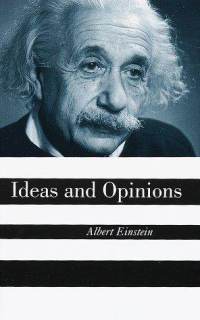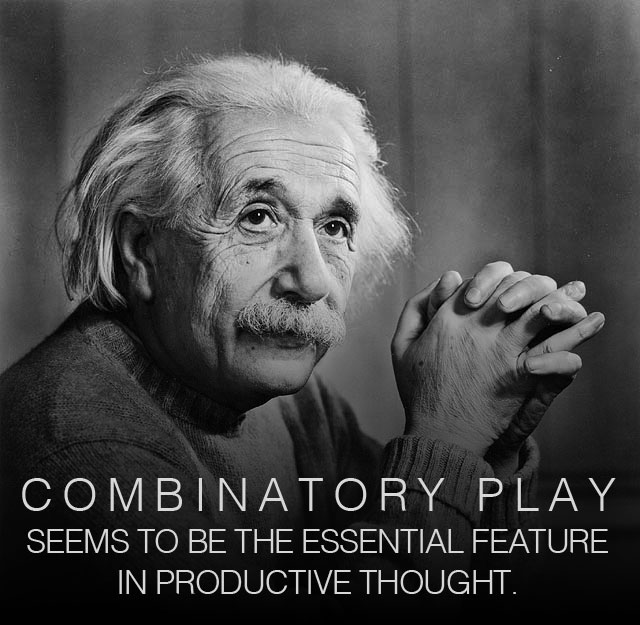
Einstein: "Convinced That A Spirit Is Manifest In The Laws Of The Universe"
***
"Combinatory play seems to be the essential feature in productive thought."
 For as long as I can remember – and certainly long before I had the term for it – I've believed that creativity is combinatorial: Alive and awake to the world, we amass a collection of cross-disciplinary building blocks – knowledge, memories, bits of information, sparks of inspiration, and other existing ideas – that we then combine and recombine, mostly unconsciously, into something "new." From this vast and cross-disciplinary mental pool of resources beckons the infrastructure of what we call our "own" "original" ideas. The notion, of course, is not new – some of history's greatest minds across art, science, poetry, and cinema have articulated it, directly or indirectly, in one form or another: Arthur Koestler's famous theory of "bisociation" explained creativity through the combination of elements that don't ordinarily belong together; graphic designer Paula Scher likens creativity to a slot machine that aligns the seemingly random jumble of stuff in our heads into a suddenly miraculous combination; T. S. Eliot believed that the poet's mind incubates fragmentary thoughts into beautiful ideas; the great Stephen Jay Gould maintained that connecting the seemingly unconnected is the secret of genius; Gutenberg's invention of the printing press embodied this combinatorial creativity; even what we call "intuition" is based on the unconscious application of this very mental faculty.
For as long as I can remember – and certainly long before I had the term for it – I've believed that creativity is combinatorial: Alive and awake to the world, we amass a collection of cross-disciplinary building blocks – knowledge, memories, bits of information, sparks of inspiration, and other existing ideas – that we then combine and recombine, mostly unconsciously, into something "new." From this vast and cross-disciplinary mental pool of resources beckons the infrastructure of what we call our "own" "original" ideas. The notion, of course, is not new – some of history's greatest minds across art, science, poetry, and cinema have articulated it, directly or indirectly, in one form or another: Arthur Koestler's famous theory of "bisociation" explained creativity through the combination of elements that don't ordinarily belong together; graphic designer Paula Scher likens creativity to a slot machine that aligns the seemingly random jumble of stuff in our heads into a suddenly miraculous combination; T. S. Eliot believed that the poet's mind incubates fragmentary thoughts into beautiful ideas; the great Stephen Jay Gould maintained that connecting the seemingly unconnected is the secret of genius; Gutenberg's invention of the printing press embodied this combinatorial creativity; even what we call "intuition" is based on the unconscious application of this very mental faculty.
The concept, in fact, was perhaps best explained by Albert Einstein, who termed it "combinatory play." (Einstein famously came up with some of his best scientific ideas during his violin breaks.) From hisIdeas and Opinions (public library) – the same invaluable volume that gave us the beloved physicist's timeless wisdom on kindness and our shared existence – comes Einstein's single most succinct articulation of how his mind works, driven by this powerful combinatorial creativity. The 1945 letter was written in response to French mathematician Jacques S. Hadamard's survey of the mental processes of famous scientists, inspired by polymath Henri Poincaré's famous meditation on the subject and published as An Essay on the Psychology of Invention in the Mathematical Field, with Einstein's missive included as a "testimonial":
My Dear Colleague:
In the following, I am trying to answer in brief your questions as well as I am able. I am not satisfied myself with those answers and I am willing to answer more questions if you believe this could be of any advantage for the very interesting and difficult work you have undertaken.(A) The words or the language, as they are written or spoken, do not seem to play any role in my mechanism of thought. The psychical entities which seem to serve as elements in thought are certain signs and more or less clear images which can be "voluntarily" reproduced and combined.There is, of course, a certain connection between those elements and relevant logical concepts. It is also clear that the desire to arrive finally at logically connected concepts is the emotional basis of this rather vague play with the above-mentioned elements. But taken from a psychological viewpoint, this combinatory play seems to be the essential feature in productive thought – before there is any connection with logical construction in words or other kinds of signs which can be communicated to others.(B) The above-mentioned elements are, in my case, of visual and some of muscular type. Conventional words or other signs have to be sought for laboriously only in a secondary stage, when the mentioned associative play is sufficiently established and can be reproduced at will.(C) According to what has been said, the play with the mentioned elements is aimed to be analogous to certain logical connections one is searching for.(D) Visual and motor. In a stage when words intervene at all, they are, in my case, purely auditive, but they interfere only in a secondary stage, as already mentioned.(E) It seems to me that what you call full consciousness is a limit case which can never be fully accomplished. This seems to me connected with the fact called the narrowness of consciousness (Enge des Bewusstseins).
Ideas and Opinions is superb from cover to cover, the kind of book you return to again and again, only to find new layers of meaning with each reading. Complement it with this vintage technique for producing ideas and Einstein on the secret of learning anything.

No comments:
Post a Comment